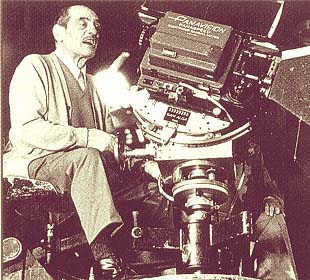Mar
31
Class Response
Posted by: Brian | March 31, 2009 | Comments Off on Class Response
I really enjoyed the first half of the term because I found the films more interesting. However, I will be honest, this class made me watch films I would never consider watching, such as The Wild Bunch. Then again, after I read the articles and had a historical context to ground the film in, I found an appreciation for it. Overall, I think this class taught me how analyze films from a historical and social context. I found this an interesting approach because in other film classes I have taken, we have read everything from body language, to scene change, to camera position and frame set-up. However we neglected to talk about the films’ relevance to historical and social movements and in addition to see how Mexico is constructed through several different gazes. I think I could have grasped some of the themes in the Mexican films better, had we been given more of a historical context before we watched the movies. Then again, it could have been suggested that we read the articles before watching the films because that way, we could know what to look for and what themes to consider. On the other hand, it is difficult to say because it is important to formulate our own analysis of the film as well before we fall back on what the critics have to say about the film. I also was under the impression that we were going to speak in Spanish and so I was somewhat disappointed about that aspect of the class. Not to say, I would have understood all of the material, but I would have preferred it. I think one of the most interesting articles we read was how stereotypes have been constructed on the basis of colonialist assumption, or rather anxiety. This is interesting because it considers the formulation of identity and explains why many of the Hollywood films often depict the Mexicans, or native people at that, as less civilized, and almost barbaric. Yet then again, the romanticized portrayals of Mexicans were enjoyed and rather applauded by Mexican audiences because it showed them in a light they wanted to aspire of becoming. I remember our first conversation and our discussion of this type of mystification and how it functioned as a false set of ideals never to be reached. Another discussion I enjoyed was about the eroticism found in Las Cantiflas between the men. This brought up cultural difference and whether we could in fact, consider the men’s displays of affection as anything homoerotic. With the film Los Olvidados, we discussed the documentation of reality or what can be considered “real.” This raised interest in stylistics, such as Bunuel’s use of surrealism and the socio-meaning behind Pedro’s dream. I am not sure what to say about Mecanica Nacional, only that I found the grandmother to be hilarious and the film strangely odd. With this film, I know we talked about machismo nature and the role of the women in this film, as there is the busty woman, who is sassy, but then there is the daughter of the protagonist, who is submissive and meek. El Callejon de los Milagros was a great film and showed several different storylines. I remember discussing the presence of homosexuality in the film and how it eventually the main protagonist was outright about his practice of it. La batalla del cielo, I found it interesting because it gave a real and accurate portrayal of the practice of religion, however the film was somewhat slow in its plotline. Que Viva Mexico was almost like the filming of a national geography, yet it changed considerably near the middle of the plot and became an action film. Touch of Evil was an okay film. I found it funny that the hero was made a Mexican, who was in reality an American playing a Mexican. If that were ever to happy now-a-days, that film would come under some deep heat. I personally prefer Orson Welles’ Citizen Kane. As I mentioned earlier, I found an appreciation for The Wild Bunch, yet I was cringing all the way through, while watching it. I remember Rose brought up something about how Three Amigos would be regarded as somewhat factual in its portray of stereotypes in the United States because people’s knowledge of Mexico is primarily based off of films. Yet, I am not sure if I agreed with her because the film is a known comedy and therefore audiences watch the film, knowing that the film and humor is generally modeled off of exaggerated depictions. I think she should have more faith in her fellow citizens. Lastly, Traffic showed different facets of humanity being affected by the war on drugs. I enjoyed our conversation in class about the anti-hero and whether or not this film has any type of solution to the problem. Then again, the content of the film is not that easy and it would not carry the same weight as it did, had it come up with some trite, artificial solution. Well thanks for an interesting class and I will now never see another movie about Mexico the way I saw it before after watching so many different cinematic gazes.
